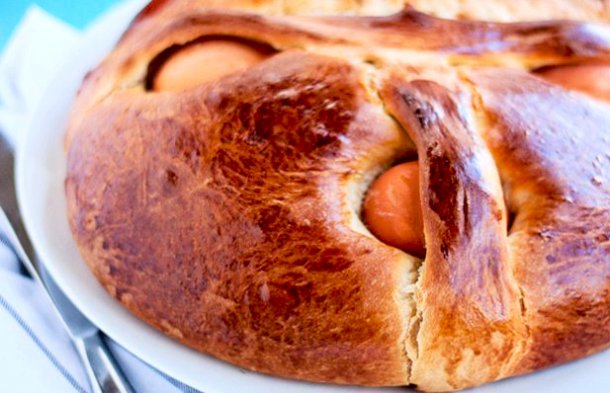By Eddy − On Sunday, March 12, 2017, 7 years ago in
Bread Recipes
5 out of 5 with 142 ratings
comments: 2 - views: 130075

| Preparation time | 25 min |
| Cooking Time | 40 min |
| Ready In | 1 h 5 min |
| Level of Difficulty | Easy |
| Servings | 8 |
Ingredients
1 cup (250ml) warm water, divided1 tablespoon (11g) active dry yeast3/4 cup (170g) plus 1 tablespoon granulated sugarabout 5 1/2 cups (750g) all purpose flour (may need additional while kneading, about 1/4 cup)1 teaspoon salt1 stick (4oz or 114g) unsalted butter, cut into cubes3/4 teaspoon pure lemon extract4 large eggs, lightly beatenEgg Wash:1 large egg beaten1/2 tablespoon waterHard Boiled Eggs:4 large eggsSkin of 2 onions1 teaspoon salt
Get Portuguese ingredients 
Instructions
Makes 1 large bread, or 2 medium
- In a small bowl, combine 1 tablespoon sugar and 1/4 cup of warm water, and lightly sprinkle 1 tablespoon of active dry yeast over the mixture and allow it to sit for 5 to 10 minutes until foamy.
- In the bowl of a stand mixer fitted with the paddle attachment, combine the flour, salt, and cubed butter.
- Mix on low speed to combine and add in the eggs, sugar, remaining 3/4 cup warm water, lemon extract, and yeast mixture.
- Switch to a dough hook and mix on medium-low speed for about 10 minutes (you may need to add additional flour, 1 tablespoon at a time during mixing if the dough feels too wet).
- You want to knead the dough until it is smooth and elastic and tacky but not sticky.
- Coat a large bowl with vegetable oil.
- Shape dough into a ball, put into the bowl and turn to coat with the oil.
- Cover the bowl lightly with plastic wrap and set aside in a warm draught free area (I put into my oven with light turned on), for about 2 hours or until dough has doubled in size.
- Meanwhile, bring 4 eggs (brown or white), salt, and peel of 2 yellow onions to a boil in a medium saucepan (the onion skin acts as a natural way to colour the white eggs brown, or enhance a brown egg).
- Once boiling turn off heat and allow eggs to sit for about 10 minutes.
- Remove eggs from water, and put aside.
- Adjust rack to middle position and preheat oven to 350°F or 180°C.
- Reserve a small amount of dough, about 1/2 cup, to make cross decoration.
- Knead the remaining dough a few times to get the air out.
- Shape into one or two (medium) round loaves and gently press the unpeeled hardboiled eggs into the dough.
- Create 2 or 4 long long flat pieces of dough to place over the eggs.
- Place the dough strips over the eggs and press the ends into the round dough to create a cross.
- Brush the entire top of the dough with the egg wash.
- Bake for 35 to 40 minutes until the top is golden brown and there is a hollow sound when tapped.
- Set aside to cool.
Storage: 3 days wrapped at room temperature, or wrap tightly and freeze for up to 1 month.
Recipe & Photo Credit: Jessica, portuguesegirlcooks.com


